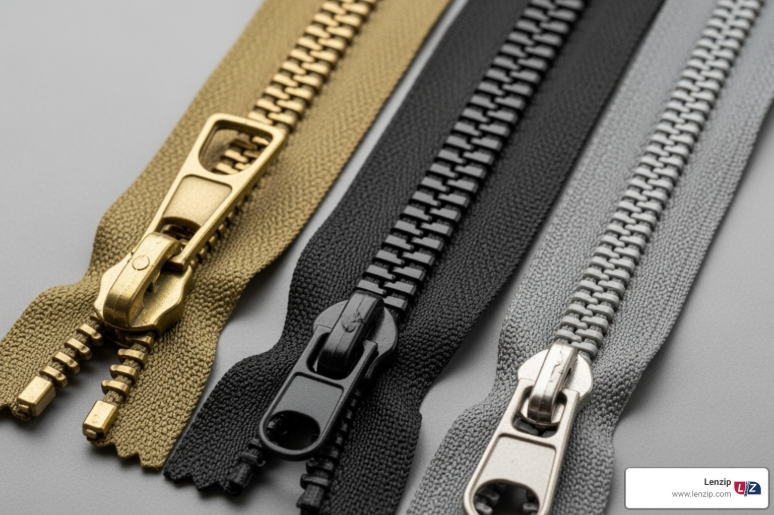In tents, tarps, marine covers, and large industrial enclosures, fabric strength is only half the story. The closure system often determines whether the structure succeeds or fails in the field. That’s why load-bearing zippers are mission-critical. These aren’t everyday fasteners; they are engineered systems designed to transfer tension, resist stress, and maintain structural integrity across expansive surfaces.
For OEMs and product designers, zipper choice directly impacts product durability, safety, and customer trust. At LenZip, a U.S.-owned zipper manufacturer with more than 80 years of experience, we’ve helped OEMs across industries engineer custom zipper solutions for load-bearing and high-performance fabric systems.
Why Load-Bearing Zippers Are Different
Most zippers are designed for light-duty applications such as apparel or accessories. But in large fabric systems—marine enclosures, tarps, tents, safety barriers, and architectural fabrics—the forces acting on zippers are far greater. These zippers must carry fabric tension, resist environmental exposure, and maintain alignment under load.
Unlike consumer-grade zippers, industrial load-bearing zippers are specified for tensile strength, long service life, and structural continuity. In tents and tarps, they may hold entire wall panels together. In marine covers, they must withstand wind, UV radiation, and salt spray. In aerospace or industrial enclosures, they safeguard valuable equipment against environmental stress.
The stakes are high: a zipper failure in these contexts can compromise the entire structure. That’s why load-bearing zippers must be engineered differently—from the gauge of the teeth to the composition of the tape and sliders.

Key Design Considerations
One of the most important factors in designing load-bearing zippers is gauge size. Zippers are measured by the width of their teeth in millimeters, with common heavy-duty options including #10, #15, and #20. Larger gauges deliver greater shear resistance and holding power, making them essential for structural fabric zippers used in industrial covers, tents, tarps, and marine enclosures.
The type of teeth also matters. Molded tooth zippers made from acetal or polyester resin provide outstanding durability, impact resistance, and UV stability. They are frequently used in tarps, tent doors, and marine covers. Coil zippers, constructed from continuous nylon filament sewn to reinforced tape, offer smoother operation and greater flexibility—ideal for curved panels or marine windows. Metal zippers, usually brass or steel, remain the strongest option in sheer tensile performance, though they are less resistant to corrosion unless specially plated or coated.
Tape is equally critical. In load-bearing systems, the tape is what transfers forces from the zipper teeth into the surrounding fabric. Reinforced polyester or aramid-blend tapes, sometimes double-stitched or web-backed, ensure that zipper strength matches the demands of the structure. Coatings for waterproofing, UV resistance, or fire retardancy further extend service life.
Finally, sliders must be chosen for both function and durability. Autolock sliders prevent accidental opening under vibration or stress. Double-pull sliders allow access from either side, which is useful in tents, marine covers, and large industrial enclosures. Premium alloys and polymers are used to prevent slider distortion under repeated loads.
Preventing Failures in Load-Bearing Zippers
Even the best-designed fabric system can be undermined by a poorly specified zipper. Common failure points include broken teeth, distorted sliders, and tape tearing under stress. Misalignment during installation can also cause separation or jamming.
The solutions lie in proper engineering and testing. Oversized gauges prevent shear failure. Reinforced tape and high-denier materials ensure that seams do not tear under load. Sliders manufactured from brass, stainless steel, or reinforced polymers resist deformation. And rigorous testing—including cycle testing, UV exposure, and salt spray simulation—ensures long-term performance before products reach the field.
By addressing these factors during design, OEMs can extend the service life of their load-bearing zippers and prevent costly warranty issues.

Custom Zipper Manufacturing for OEMs
There is no one-size-fits-all zipper for large fabric applications. Every structure—whether a marine cover, industrial tarp, or architectural enclosure—has unique requirements. That’s why OEMs turn to custom zipper manufacturing.
At LenZip, we provide large-gauge zippers engineered to specific performance needs. Our options include water-resistant zippers with welded tape, UV-stabilized molded teeth, flame-retardant tapes, and reinforced sliders. For marine and outdoor applications, we supply corrosion-resistant finishes and hydrophobic coatings. For structural fabrics, we integrate reinforced zippers into welded seams and tensioned panels.
As a zipper manufacturer USA, LenZip offers advantages beyond engineering. OEMs benefit from rapid prototyping, rigorous in-house quality control, and secure domestic supply chains. That means faster lead times, consistent quality, and the flexibility to scale from prototypes to production runs without overseas delays.
Industry Applications
The versatility of load-bearing zippers spans industries. In marine environments, they are used in boat enclosures and mooring covers that endure wind, salt, and sunlight. In tents and tarps, they provide secure entry points and modular wall systems for events, military shelters, and disaster relief operations. In aerospace, they seal covers and enclosures that must withstand extreme vibration and temperature changes. And in architectural fabrics, they enable modular repairs and seasonal flexibility in tensile structures and awnings.
Across all of these sectors, the principle is the same: zipper strength defines system reliability.
FAQ About Load-Bearing Zippers
Q: What gauge zipper is best for large fabric applications?
Most load-bearing zippers use gauges #10, #15, or #20, depending on the size of the fabric panels and the tensile forces involved. Larger gauges provide greater holding power.
Q: Can coil zippers be used in load-bearing systems?
Yes, but only when reinforced with wide polyester tape and designed for curved or flexible applications. For high-tension, straight-line closures, molded tooth or metal zippers are more reliable.
Q: Are load-bearing zippers available in water-resistant or fire-retardant versions?
Absolutely. OEMs can specify water-resistant coatings, UV inhibitors, or fire-rated tapes for industrial zippers designed for tents, tarps, or protective enclosures.
Q: What causes load-bearing zippers to fail?
Common causes include undersized gauges, weak tape, low-quality sliders, or misalignment during installation. Choosing a trusted OEM zipper supplier helps prevent these issues.
Q: Why choose a U.S.-owned zipper manufacturer?
Working with a zipper manufacturer USA like LenZip provides faster delivery, tighter quality control, and secure supply chains—critical for large projects where delays are costly.
Conclusion: Zipper Strength Defines Integrity
In large fabric systems, a zipper is not just a closure—it’s a load-bearing component that determines structural integrity. From marine zippers and tent zippers to industrial enclosures and architectural fabrics, the right zipper choice extends product life, enhances safety, and ensures customer satisfaction.
At LenZip, we engineer and manufacture custom load-bearing zippers that meet the highest performance standards. With more than eight decades of expertise as a zipper factory in the USA, we deliver closures that are built to last, tested under real-world conditions, and produced with OEMs in mind.
Talk to a zipper specialist today or request a quote at (847) 368-9000 to learn how LenZip can support your next large fabric project.
